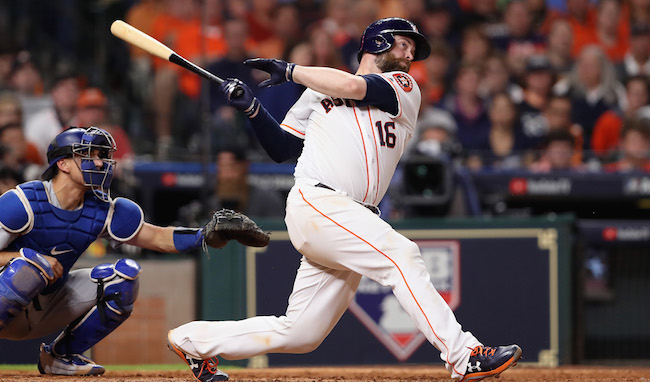
The final of Game 5 of the World Series read like a misprint, with the Astros beating the Dodgers 13-12. In total, the teams combined to hit seven home runs, bringing the series’ total to 22 (the most in history, despite only being five games in).
Yuli Gurriel, Cody Bellinger, Jose Altuve, George Springer, Carlos Correa, Brian McCann, and Yasiel Puig all deposited pitches into the seats and, in total, there were 28 combined base hits on the evening to produce 25 runs. It was a delightful game to be a hitter, and a nightmare for the pitchers. The home runs hit on Sunday night varied from absolute bombs, like the one hit by George Springer, to absolute jokes, like the pop fly that somehow got out for Carlos Correa.
Did the ball blow up 😳#WorldSeries pic.twitter.com/tprwt2I2Xc
— Bleacher Report (@BleacherReport) October 30, 2017
Carlos Correa HOME RUN!! 🇵🇷#WorldSeries #EarnHistory pic.twitter.com/QnUOTD2ZZU
— All Sport News (@All_SportNews) October 30, 2017
However, what each dinger brought us was a little more excitement and a little more controversy. There have been grumblings that Major League Baseball has juiced the balls in an effort to produce a little more excitement. Fans, media, and former players have all pointed to the spike in home runs hit as evidence, and for anyone searching for confirmation bias, Game 5 provided it.
Fans, media, and former players couldn’t help but have a skeptical view of the way the balls were jumping off the bats in Minute Maid Park on Sunday, a microcosm of the series and season as a whole.
So thankful they juiced the ball after I retired. So damn thankful.
— dan haren (@ithrow88) October 30, 2017
The balls in my pants have less juice in them then the balls in this game
— Jose Canseco (@JoseCanseco) October 30, 2017
Baseball fans are conditioned to question everything after the steroid era. Nothing can simply be as it seems, because if the past has taught us anything, it’s that something nefarious is afoot if baseball gets too fun. It’s quite possible they’re right, and that baseball (rightfully) came to the conclusion that it needs steroid era type home run production without all of the drugs to try and bring some excitement back to the game and draw in the casual fan.
There will be plenty hardcore fans that lament what we saw in Game 5 and who think a pitching duel is just as exciting as a shootout, but if basketball and football have taught us anything, it’s that the casual fan tunes in when the pace picks up and more points get scored. Baseball would be smart to follow suit, and while their efforts in speeding up the game may not have had a substantial impact yet, dialing up the home runs with some changes to the ball certainly will.
If baseball is juicing the balls, who does it hurt? Maybe pitchers, but even then if everyone’s dealing with the same thing, theoretically they’ll all see relatively similar changes in stats and thus the market shouldn’t change significantly. The best argument against steroids and PED’s is the potential negative health effects they have on players and how they make for a not level playing field. Juiced balls instead of juiced players seems to get rid of both of those issues and, if it can create a similar result, then that seems great. Right?
Game 5 was thrilling. At no point did either team seem out of it, even when the Dodgers came to the ninth inning down three runs, because the threat of the home run was always there — and Yasiel Puig delivered with a two-run homer to close the gap to one run. It was what people want out of their sports viewing experience: excitement, drama, and a little bit of absurdity. It was also the best single example yet for the juiced ball conspiracy, and, for baseball if that is indeed true, was the best explanation for why they’ve done so.






